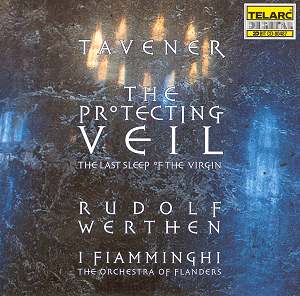Musicians are, by and
large, a pragmatic bunch. Talking to
some during an interval break at a concert
for which I was doing some page turning,
I asked what they thought of Tavener
– knowing that they had recorded a fair
number of his works. "Oh, the arrogance
of the man" came the surprisingly
impassioned reply, "but at least
we made some money from those recordings."
What indeed is one to make of other
recordings of a work when the composer
himself once announced that Steven Isserlis
was the only soloist who could do it
justice? "Just smile and wave"
like the Penguins in ‘Madagascar’; leave
all of the mysticism and hype to one
side and take the music and performance
at face value.
While I don’t have
the Isserlis/LSO/Rozhdestvensky recording
to hand, I do know it well, and I must
say I am highly impressed by this alternative.
It has been available since 1998, but
has now been reduced to mid-price by
Telarc, so those of you who know and
love The Protecting Veil can
splash out and rediscover the work all
over again. The acoustic of Onze Lieve
Vrouw in Gent is ideal for this music.
There is plenty of richly atmospheric
resonance, and the notes are surrounded
by a special aura of thrilling wonder
which the music in both works on this
CD is all about. The solo part is beautifully
played, and the orchestra have a lightness
of touch which allows the slightly lumbering
Annunciation and Resurrection
movements to work better, making
you less likely to reach for the fast-forward
button. If you can manage to find a
patient shop assistant, get him to play
you the second Nativity of the Mother
of God movement. Revel in the subtle
play between soloist and strings, noting
how the solo line grows organically
from within the quiet textures of the
orchestra, advancing and receding like
evening sunlight on calm water. Then
there are those open, medieval-sounding
passages which draw you into more symbolic,
icon-like imagery. The louder passages
provide a different kind of contrast,
but with a beautiful cello duet weaving
through the fervent strings those moments
could almost be chiming bells.
Moving on to The
Last Sleep of the Virgin I was pleasantly
surprised to read that the premiere
performance was with the Chilingirian
Quartet and percussionist and festival
organiser Kim Sargent, who I came to
know during his brief and sadly troubled
couple of years as adjunct-director
at my place of work, The Hague Conservatoire.
It is to the version with dedicatees
the Chilingirian Quartet on Virgin Classics
that I turn for comparison. I have to
say that, while the Rudolf Werthen’s
string orchestra arrangement is perfectly
acceptable, the quartet recording wins
hands-down.
The Chilingirians are
also recorded in a church acoustic,
with the bells generally softer in the
mix, and with a more rounded sound and
far less obvious attack, allowing the
resonances to combine in a quite magical
effect. The quartet performance is also
more sustained, coming in over two minutes
longer than I Fiamminghi. With the string
lines as solos there is a greater intensity
at certain crucial moments, where with
a whole string orchestra some of the
trills just reminded me of Respighi.
The addition of basses does have an
impressive effect at some points – the
rising interval at 15:30 led my brain
straight to Ives’ The Unanswered
Question. Where there are solos
written into the arrangement these come
over as being just a little too ‘cute’,
the diminution in scale from whole section
to solo never having been part of the
score in the first place. The general
effect of, in the composer’s description,
being barely able to hear the music,
its being almost beyond one’s grasp,
is effectively conveyed by the Chilingirian
Quartet’s recording. With I Fiamminghi
it’s a slightly more restless night:
more ‘The Last Sleep as the Virgin’,
for which impertinence I remain unrepentant.
If you do not know
the Chilingirian Quartet recording don’t
be put off. Like the penguins in ‘Madagascar’;
"you never heard anything…."
The Last Sleep of the Virgin is
a genuine 20th century classic
to my ears, and like all good music
can take being mauled around a little
in its stride. I have thoroughly enjoyed
revisiting these works, and recommend
this CD highly for its shimmering beauty.
Dominy Clements


